- Home
- Gary Corby
Death on Delos
Death on Delos Read online
Also by Gary Corby
The Pericles Commission
The Ionia Sanction
Sacred Games
The Marathon Conspiracy
Death Ex Machina
The Singer from Memphis
Copyright © 2017 Gary Corby
All rights reserved.
First published in the United States by
Soho Press, Inc.
853 Broadway
New York, NY 10003
Library of Congress Cataloging-in-Publication Data
Corby, Gary.
Death on Delos / Gary Corby.
Series: An Athenian mystery; 7
ISBN 978-1-61695-821-3
eISBN 978-1-61695-822-0
1. Private investigators—Greece—Athens—Fiction. 2. Nicolaos (Fictitious character: Corby)—Fiction. 3. Diotima (Legendary
character)—Fiction. 4. Murder—Investigation—Fiction. 5. Sacred
space—Greece—Fiction. 6. Delos Island (Greece)—Fiction. 7. Greece—History—Athenian supremacy, 479–431 B.C.—Fiction. I. Title
PR9619.4.C665 D43 2017 823’.92—dc23 2016054524
Map © Megan Corby
Interior design by Janine Agro, Soho Press, Inc.
Printed in the United States of America
10 9 8 7 6 5 4 3 2 1
For Catriona
She was eight years old when I began these books.
Now she’s a young lady about to take on the world,
and the world is in for a pleasant surprise.
The Actors
The names in this book are genuine ones from the classical world. Some are still in use. To this day there are people named Nicolaos. It’s also the origin of our Nicholas. Other names you might already know because they belong to famous people, such as Pericles.
But some names from thousands of years ago are unusual to our modern eyes. I hope you’ll say each name however sounds happiest to you and have fun reading the story.
For those who’d like a little more guidance, I’ve suggested a way to say each name in the character list. I have included some deity names, a few place names, and a couple of nation names that might also be exotic. My suggestions do not match ancient pronunciation. They’re how I think the names will sound best in an English sentence.
That’s all you need to read the book!
Characters with an asterisk by their name were real historical people.
Diotima*
DIO-TEEMA
A pregnant priestess of Artemis
“You can carry the next one.”
Nicolaos
NEE-CO-LAY-OS
(Nicholas)
Diotima’s husband
“We’re on a mission from the gods.”
Geros
GE-ROSS
An old priest of Apollo
“You pollute the sanctuary by your very presence.”
Anaxinos
AN-AX-IN-OS
High Priest of the Delian Apollo
“This is a problem I find with many Athenians.”
Pericles*
PERRY-CLEEZ
A politician and General of Athens
“I fear you have some distance to go with your negotiation skills. Killing the other party is not the normal tactic.”
Damon
The modern DAMON
Head man of the village on Delos
“You’re not like the other Athenians. They think too much.”
Semnos
SEM-NOS
Captain of Paralos
“Can I help it if I’m the most handsome man in Athens?”
Moira
The modern MOIRA
An innkeeper
“One of the few things we got enough of on this island is goats.”
Meren
MER-EN
(like Merryn)
A young villager and priestess of Artemis
“Apollo gets the glory on Delos, but we who serve the Goddess have the oldest temple.”
Karnon
KAR-NON
Accountant of the Delian Treasury
“A talent here, a talent there, and pretty soon you’re talking real money.”
Marika
The modern
MARIKA
Slave to Karnon
“You look like you might soon have a son of your own.”
Philipos
The modern
PHILIP + OS
Assistant to Pericles
“I fell into a hole.”
Axiagos, Enalkides
and Orotheremes
AX-E-AG-OS, EN-ALK-EED-EEZ,
ORO-THE REMEEZ
Guards
“The pay’s bad, but we
get fed, and there’s not
much chance of dying, you
know?”
Ekamandronemus
EEK-AM-ANDRON-E-MUSS
A slave with a long name
“Everyone calls me
Ekamandronemus, sir.”
Phaenarete*
FAIN-A-RET-EE
Mother of Nico, a midwife
“Dear Gods, boy, did I teach you nothing about how to care for your wife?”
Sophroniscus*
SOFF-RON-ISK-US
Father of Nico
Mentioned in conversation.
Euterpe
YOU-TERP-EE
Mother of Diotima
Mentioned in conversation.
Pythax
PIE-THAX
Father of Diotima
Mentioned in conversation.
Eileithyia*
E-LETH-EYE-A
Goddess of childbirth and midwifery
“Hera, the mother of the gods, sent Eileithyia all the way from faraway Hyperborea to Delos, to assist with the birth of Apollo and Artemis. Everyone knows that.”
Hyperborea*
HYPER-BORRE-A
A mysterious land
“One of my assignments is to tend the graves of the Hyperborean Women.”
Phoenicians*
FO-NEESH-E-ANS
A sea-going people, a client state of the Persian Empire
The Phoenicians claimed to be the best sailors in the world, though everyone knew we Hellenes were better.
Kyzikos
KIZ-I-KOSS
A province in the Persian Empire
“Kyzikos isn’t just some Hellene city on the coast that the Persians happen to have conquered.”
Breto & Melippos
BRE-TOW & MEL-E-POSS
Sons of Marika
“You’re only a child once,
you know.”
The Chorus
Assorted priests, priestesses, sailors, guards, villagers, and too many goats.
DEATH ON DELOS
The Sacred Isle of Delos
Arrival
It is illegal to die on the sacred isle of Delos. It is also illegal to give birth there. I wasn’t worried about death, but of childbirth we were in some danger, for my wife was heavily pregnant.
“Are you sure you’re all right?” I asked Diotima anxiously.
“Yes, of course I am,” she replied in exasperation. “You’ve asked the same thing a hundred times, Nico. You can stop now.”
I would have to stop anyway, because the boat on which we traveled, Paralos, was about to touch land. I grabbed Diotima’s arm, in case she fell over whe
n the trireme came alongside the dock.
Delos was an island so small that you could walk around its coast in a day. Yet the long pier that protruded from her warm sands would have done credit to a major naval yard. In addition to being the birthplace of two gods, Delos was also the headquarters of the Delian League, the mutual defense alliance of the Hellenes, and it was here that the League’s treasury was kept. It was perfectly normal for warships to visit, and for Delos to need port facilities that could host a major vessel, such as the one on which we stood.
Paralos was a trireme designed for war, yet kitted out with fittings of gold. Her scrubbed deck shone in the brilliant sun and there were colorful ribbons threaded into the ropes that the sailors used. Her crew, down to the lowest oarsman, could have attended a party without having to change clothes, so fine and gaudy were their outfits. Her captain was one of the most fashionable men in Athens. This was the first time I’d ever been on a warship and felt underdressed.
For Paralos was a very special navy boat. Her task was to carry sacred offerings wherever they needed to go, and to represent Athens on religious occasions wherever an Athenian might properly worship the gods. Paralos might belong to the fleet, but her orders originated with the temples.
It was on temple business that Diotima and I traveled. Every year the Athenians sent expensive offerings to Delos, in honor of the divine twins, Apollo and Artemis. This year, when the lots had been cast to determine which priestess should accompany the offerings, the job had fallen to Diotima, who had been a priestess of Artemis since she was sixteen.
“Stand by to dock,” the steersman called from his position of power by the tiller.
“Oars in,” the port and starboard officers called almost in unison.
The men pulled in oars.
The boat slid alongside so gently that it almost stopped itself.
It was like an elegant show that the crew had done many times before. I had been on serious warships, where each of these maneuvers would have been accompanied by much swearing and roughness. On Paralos, all was serenity. Except for me.
I glanced nervously over my shoulder at the ships lined up behind us. It was a large fleet. Fifty triremes. Fifty serious triremes from Athens, with Pericles at their head. A fleet that size could take on the navy of any other city and expect to win.
The priests and priestesses of Delos would be pleased to see Diotima and the gifts she brought.
They would be less thrilled when they heard what Pericles had to say.
The Treasure
A small reception party waited to greet us: two priests and two priestesses wearing chitons of bright material that reached to their feet and covered their arms. It wasn’t the sort of garb anyone would willingly don on a hot summer day, despite which all four smiled at our arrival. Beside them stood a man who was dressed in faded robes of gray, and with a hood pulled over his head. He carried a long staff, which he did not lean upon, but held like a badge of office. He looked out of place beside the others.
At the head of this group was another man, dressed as colorfully as the priests but older, balding, and with an air of command about him. He smiled broadly as I helped Diotima onto dry land. His smile faltered as Diotima began to walk, or rather waddle, down the pier. The smile fell a little further with every step she took.
“My name is Anaxinos,” he said, when we stopped before him. He spoke politely. “It is my honor to serve as High Priest of the Delian Apollo, and therefore Archon of the Sacred Isle.” He paused, then asked, “Are you the priestess sent by Athens?”
“I am,” Diotima said in a clear voice with a lift of her chin. “My name is Diotima.”
Anaxinos glanced down at her maternal state.
“I hope you won’t take this the wrong way, young lady, but please tell me you won’t be staying with us for long.” He said it kindly, but the message couldn’t be clearer.
“I am somewhat aware of the problem,” Diotima said drily. “I’ve been assured that the dedication of the offerings is a matter of days.”
“That is true,” the High Priest agreed.
“Then there is little chance of . . . er . . . an accident while I am here, and in any case I was chosen by the Goddess.”
Anaxinos raised an eyebrow at that. “Your High Priestess in Athens agreed?”
“She did.”
Diotima described how her name had been drawn from the jar, in the traditional process of casting the lots to select the priestess to accompany the gifts.
“They thought it must be some error, when the lot was drawn with my name upon it,” Diotima admitted. “They threw my name back in. The High Priestess herself shook the jar, very thoroughly, and drew again. When my name emerged a second time, it was decided that such a message from Artemis was impossible to ignore.”
Diotima had told the truth, while neatly glossing over just how controversial her appointment had been. This assignment to accompany the offerings to Delos was a prestigious one. When her name was read the first time there had been gasps from the other priestesses. The women could see the bump beneath Diotima’s clothing and knew what it meant, and they knew better than anyone that it was strictly forbidden for life to begin or end upon the sacred isle. The muttering had been so intense that the result was checked, but there was no doubt about it. For whatever reason, this year the Goddess had chosen Diotima to represent her.
“Your name came out twice?” Anaxinos said. “How very apposite for the divine twins, and as you say, impossible to ignore. Well, we shall make your stay with us as comfortable as possible.” The High Priest turned to me. “You are the lady’s husband?”
It was an easy guess, because it was inconceivable that a woman as respectable as Diotima should travel without her husband.
“I am Nicolaos, son of Sophroniscus,” I said, by way of introduction.
“Just so,” he said, polite but uninterested. “You are welcome.”
The smiles of the priests and priestesses had not faltered during this conversation, but the gray man with the staff stared at Diotima with an odd expression. I guessed he did not like what he saw.
Behind us, the men had begun to unload the sacred offerings. They were particularly rich this year. Golden vessels, cast as household items too good for any house but that of the gods; the finest black figure pottery, which only Athens knows how to make; silver jewelry set in cases crafted by the most skillful artisans; a large portrait of Apollo and Artemis set upon solid board, by the famous painter Stephanos of Vitale; life-size statues of the divine twins, cast in bronze and painted for the utmost realism. For the priests and priestesses who dedicated their lives to honoring Apollo and Artemis, we had brought the finest food that Athens could provide. Amphora after amphora was stacked upon the pier, until I thought the decking must break under the weight: there was the best wine; and olives, for which Athens was famous, grown from the ancient vine that had been planted by Athena herself; fruits and vegetables in preservative; lambs on a tether, and enough of the always popular garos fish sauce to feed a small army.
The smile of Anaxinos returned when he saw these things.
Diotima spoke the formal words that she had been taught back in Athens. “I present to you, priests and priestesses of the Holy Isle, these small symbols of Athenian piety.”
“You are doubly welcome for the gifts you bring,” Anaxinos said.
“And especially for the food,” muttered one of the priests in the background.
The other men and women, even the gray man, nodded in appreciation. It seemed that all was good in the eyes of the holy people.
“My colleagues will escort you to the sanctuary,” Anaxinos said. “The sacred offerings will be installed in one of the treasury rooms, to await their dedication. Rest assured there is no more secure location in all of Hellas; the treasury of the Delian League is kept in the same place. The ceremony is scheduled
for the day after tomorrow, to give you time to rest after the journey. We have a guest house prepared for you at the village.”
“That is thoughtful,” Diotima said.
“The village is at the other end of the island, I’m afraid. There’s a rule against living within sight of the sanctuary. We didn’t anticipate a pregnant lady. I’ll order a donkey brought so you don’t have to walk.”
“Thank you.”
I was impressed. The High Priest had everything in hand, and a ready solution for an unexpected problem. This man was a good manager.
He said, “The village is also where the stores are located. I’ll ask your men to take the food and general goods straight there. One of the priests will show them the way.”
“You are well organized,” I commented.
“We do this every year,” he said. “For you, this is perhaps a once-in-a-lifetime chance to see the most holy sanctuary in Hellas, the very birthplace of two gods. For us, this is our lifeline to civilization. The quality of what you bring defines our lives for the next year.”
That certainly was a good explanation for the avaricious way the priests and priestesses had inspected the food as it was unloaded.
“Then I hope we have not disappointed you,” I said.
“Athens has never disappointed us.”
I hoped that wasn’t about to change.
Anaxinos looked out to sea, shading his eyes against the glare of the sun, to where the fleet of triremes stood off from the shore. I could tell from the movement of his lips that he was counting.
“Tell me,” he asked, “Are you two young people of importance back in Athens, to have such an escort?”
Diotima looked at me, and I looked at her. Neither of us wanted to deliver the news.
“Uh, not exactly,” I said.

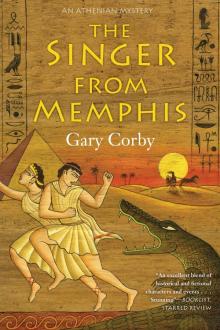 The Singer from Memphis
The Singer from Memphis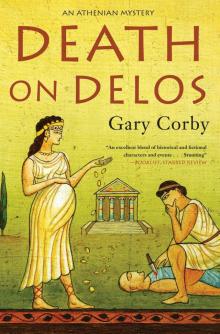 Death on Delos
Death on Delos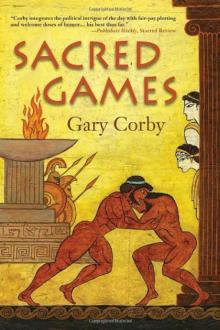 Sacred Games
Sacred Games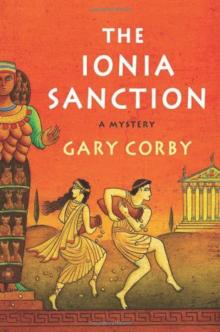 The Ionia Sanction
The Ionia Sanction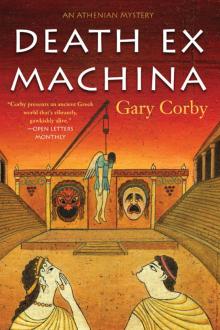 Death Ex Machina
Death Ex Machina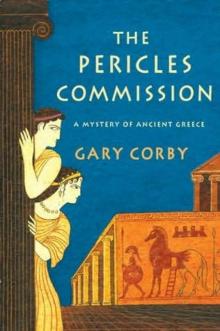 The Pericles Commission
The Pericles Commission